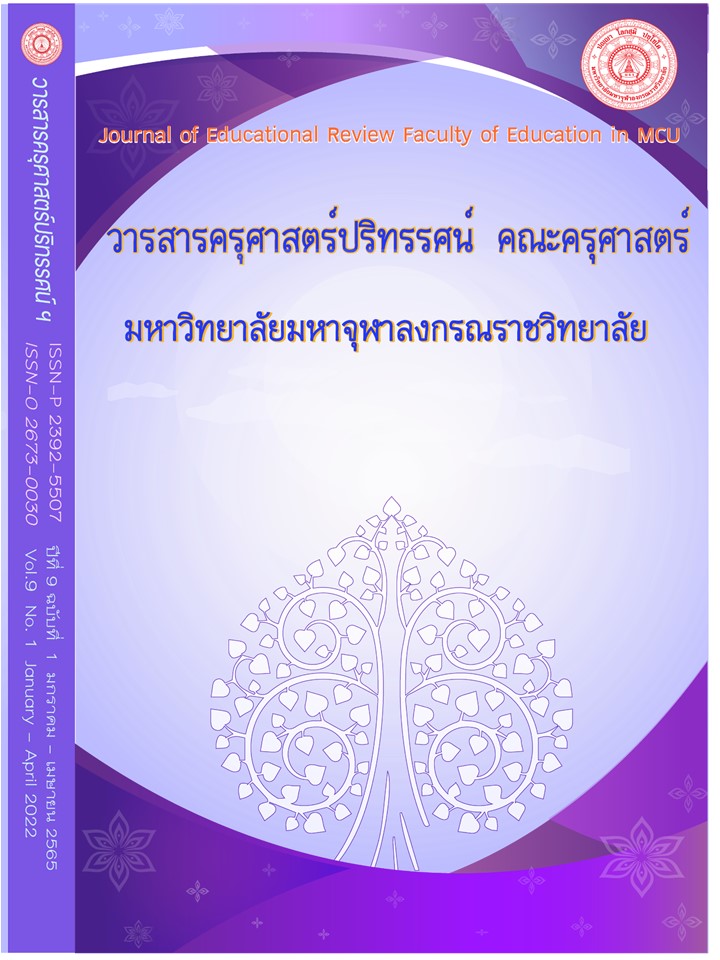ETHICAL LEADERSHIP BASED ON VUDDHIDHAMMAS FOR SCHOOL ADMINISTRATORS IN THE 4.0 ERA
Main Article Content
Abstract
Ethical Leadership based on Vuddhidhammas for School Administrators in the 4.0 Era is an administration that relies on the role of school administrators that demonstrate leadership in schools on the aspects of aware of change, being a thinker and a developer. They also have a vision in management that is ready for change, democratic administration by receiving other people's opinions, share ideas, work together, and solve problems with personnel in the organization. Developed using new innovations by considering the elements of ethical leadership are also conducted in order to be consistent with the important Buddhist way of life. The key aspects are 1) Justice, 2) Power Cooperation, 3) Functional Clarity, 4) People Focus, 5) Ethical Guidance, 6) sustainability, and 7) Integrity. It is a moral and ethical principle that is appropriate to the principles of morality which is Dharma of a growth tool and is a virtue that leads to prosperity in 4 things: 1) Sappurisangseva is the fellowship of the wise; 2) Saddhammassavana, listening to the true Dhamma and pay attention to study and find out the truth; 3 Yonisomanasikarn, mindfulness to think of reasons in the right way; 4) Dhammanudhamma practice, Dharma practice according to the principles in order to develop educational institutions to be ready for changes according to globalization and in the 4.0 era.
Article Details

This work is licensed under a Creative Commons Attribution-NonCommercial-NoDerivatives 4.0 International License.
ทัศนะและความคิดเห็นที่ปรากฏในบทความในวารสารฉบับนี้ถือเป็นความรับผิดชอบของผู้เขียนบทความนั้นเพียงผู้เดียว และไม่ถือเป็นทัศนะและความรับผิดชอบของกองบรรณาธิการ
กองบรรณาธิการขอสงวนสิทธิ์ในการคัดเลือกบทความลงตีพิมพ์และจะแจ้งให้เจ้าของบทความทราบหลังจากผู้ประเมินบทความตรวจอ่านบทความแล้ว
ต้นฉบับที่ได้รับการตีพิมพ์ในวารสารครุศาสตร์ปริทรรศน์ คณะครุศาสตร์ มหาวิทยาลัยมหาจุฬาลงกรณราชวิทยาลัย ถือเป็นกรรมสิทธิ์ของคณะครุศาสตร์ มหาวิทยาลัยมหาจุฬาลงกรณราชวิทยาลัย ห้ามนำข้อความทั้งหมดหรือบางส่วนไปพิมพ์ซ้ำ เว้นเสียแต่ว่าจะได้รับอนุญาตจากมหาวิทยาลัยฯ เป็นลายลักษณ์อักษร
References
พรชัย เจดามาน. (2560). ผู้นำในศตวรรษที่ 21: ไทยแลนด์ 4.0. แหล่งที่มา http://www.emld-rmu.com/index.php/article1/9-articles/142-21-4-0 สืบค้นเมื่อ 10 มี.ค. 2565.
พระครูปลัดธีรเชษฐ์ ฐานวโร (แก้วคุณเมือง). (2559). ศึกษาการบริหารวิชาการตามหลักวุฒิ 4 ในโรงเรียนประถมศึกษา อำเภอพระประแดง จังหวัดสมุทรปราการ. วิทยานิพนธ์พุทธศาสตรมหาบัณฑิต. มหาวิทยาลัยมหาจุฬาลงกรณราชวิทยาลัย.
พระธรรมปิฎก (ป. อ. ปยุตโต). (2543). กระบวนการเรียนรู้เพื่อพัฒนาคนสู่ประชาธิปไตย. พิมพ์ครั้งที่ 2. กรุงเทพมหานคร: สำนักพิมพ์มูลนิธิพุทธธรรม.
พระพรหมคุณาภรณ์ (ป.อ.ปยุตฺโต). (2546). พจนานุกรมพุทธศาสตร์ ฉบับประมวลธรรม. พิมพ์ครั้งที่ 12. กรุงเทพมหานคร: สหธรรมิก.
พุทธทาสภิกขุ. (2531). ธรรมบรรยาย ชุด ทศพิธราชธรรม. กรุงเทพมหานคร: สำนักพิมพ์สหมิตร.
ภิญโญ ทองมี. (2561). รูปแบบการพัฒนาคุณลักษณะภาวะผู้นำทางจริยธรรมเชิงพุทธสำหรับผู้บริหารสถานศึกษาระดับประถมศึกษาสังกัดสำนักงานคณะกรรมการการศึกษาขั้นพื้นฐาน. ดุษฎีนิพนธ์พุทธศาสตรดุษฎีบัณฑิต. มหาวิทยาลัยมหาจุฬาลงกรณราชวิทยาลัย.
มหาวิทยาลัยจุฬาลงกรณราชวิทยาลัย. (2539). พระไตรปิฎกฉบับภาษาไทย ฉบับจุฬาลงกรณราชวิทยาลัย. กรุงเทพมหานคร: โรงพิมพ์มหาจุฬาลกรณราชวิทยาลัย.
สำนักงานคณะกรรมการพัฒนาเศรษฐกิจและสังคมแห่งชาติ. (2560). สรุปสาระสำคัญ แผนพัฒนาเศรษฐกิจ และสังคมแห่งชาติ ฉบับที่ 12 พ.ศ. 2560-2564. กรุงเทพมหานคร: สหมิตรพริ้นติ้งแอนด์ทับสิขชิ่ง.
สุกัญญา รอดระกำ. (2561). บทบาทผู้บริหารสถานศึกษาในยุคไทยแลนด์ 4.0. แหล่งที่มา http://journalgrad.ssru.ac.th/index.php/miniconference/article/view/1652 สืบค้นเมื่อ 10 ก.พ. 2565.
สุเทพ พงศ์ศรีวัฒน์. (2551). ภาวะผู้นำเชิงจริยธรรม (Ethical Lcadcrship). วารสารดำรงราชานุภาพ. 7(23). 57-62.
สุวิมล ว่องวาณิช. (2549). รายงานการวิจัยโครงการเร่งสร้างคุณลักษณะที่ดีของเด็กและเยาวชน์ไทย (ฉบับสมบูรณ์). กรุงเทพมหานคร: สำนักพิมพ์พริกหวานกราฟฟิค.
Bass, B. M., and Avolio, B.J. (1993). Transformational Leadership: A Response to Critiques. in M.M. Chemers and R. Ayman. Leadership theory and research: Perspectives and direc-tions. San Diego, CA: Academic Press.
Brown, M. E., Trevino, L.K. and Harrison, D.A. (2006). Ethical leadership: A review and future directions. The Leadership Quarterly. 17. 595-616.
Chemers, M.M., and, Mill, J. (2000). Leadership Research and Theory: A Functional Integration. Group Dynamics. 1. 27-43.
Kalshoven, K., Hartog, D.N., and Hoogh, A.H. (2011). Ethical Leadership at Work questionnaire (ELW): Development and validation of a multidimensional measure. Leadership Quarterly. 22. 51-69.
Resick, Hanges, Dickson and Mitchelson. (2006). A cross-Cultural Examination of the Endorsement of Ethical Leadership. Journal of Business Ethics. 63. 345-359.


